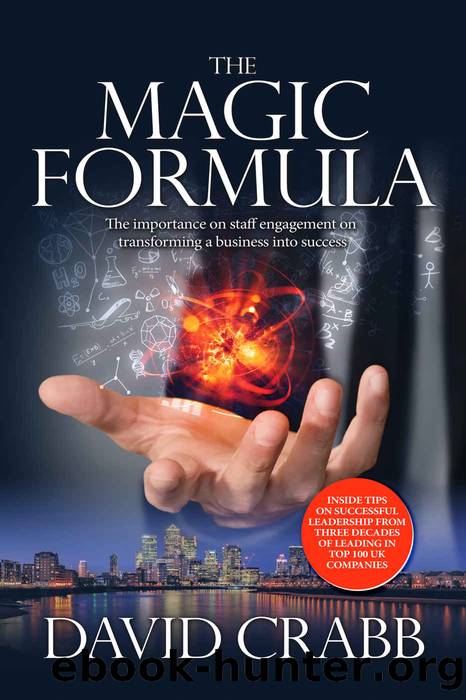The Magic Formula: The ramblings of a madman or sound Leadership guidance by David Crabb

Author:David Crabb [Crabb, David]
Language: eng
Format: epub
Publisher: Unknown
Published: 2017-10-20T04:00:00+00:00
Show me the money
Any Director will recognise the need to take risks as a necessary step towards reaping rewards at a later stage.
A business that is failing, though, may not have the luxury of time to sit back and wait for income to catch up with outgoings in the same way a profitable business may have.
If your teams are properly engaged and understand the challenges that lie ahead, they might be more accepting of a change of reward strategy in favour of the long-term gain of retaining their jobs and stability of the Company.
This is likely to be in the form of not getting a pay increase for a few years. A service business can be heavy on staff costs and, therefore, a Retail Price Index (RPI) increase or similar can be the difference between staying afloat and going under.
I have needed to deploy this strategy out of necessity, although, I would also recommend this in a profitable business. Let me explain before the squishy tomatoes get thrown at me again.
Many British companies have, for many years, taken a view that RPI or inflationary increase is given as a flat rate to all staff as a fair reward based on the cost of living increasing.
In more recent times, more and more Companies have adopted a variant to this thinking. They keep the same overall increase, say 2.5% for example, but give some staff 4% and others 1%, provided the overall expense is within budget.
This is a great approach, as those who work hardest or more effectively should get recognised separately to those who are happy to turn up every day and just do what is asked of them.
I am not trying to decree the consistent, hard-working person who is happy just doing what they need to. All businesses have these people and they play a vital role. I am, however, saying that some people deserve more than others in each review period, based on their contributions or effort. To those who push themselves beyond the everyday, it would be de-motivating to receive the same rewards as those who did not.
This is a common reason for people leaving. It is not just the pay, but the principle that their efforts are not recognised.
Letâs now take this a step further and be a little more controversial (who me?).
Imagine a working culture where there isnât a salary rise â ever.
The salary increase budget is still agreed by the board and in place. Letâs say itâs 2.5% of total salary costs. Rather than the awkwardness of the annual appraisal, where manager and staff sit and reminisce over achievements, letâs replace it with a monthly 1-2-1 meeting.
In the meeting, issues are raised on both sides, praise is given and objectives are set for the next month, documented and shared.
Then, add in a self-scoring mechanism to be discussed with the personâs manager. The self-scoring methodology is simple and awards points for doing a good job (as expected), for going the extra mile and/or for bringing in innovation or creativity.
Download
This site does not store any files on its server. We only index and link to content provided by other sites. Please contact the content providers to delete copyright contents if any and email us, we'll remove relevant links or contents immediately.
Zero to IPO: Over $1 Trillion of Actionable Advice from the World's Most Successful Entrepreneurs by Frederic Kerrest(4521)
Machine Learning at Scale with H2O by Gregory Keys | David Whiting(4293)
Never by Ken Follett(3937)
Harry Potter and the Goblet Of Fire by J.K. Rowling(3848)
Ogilvy on Advertising by David Ogilvy(3604)
Shadow of Night by Deborah Harkness(3360)
The Man Who Died Twice by Richard Osman(3072)
Book of Life by Deborah Harkness(2931)
The Tipping Point by Malcolm Gladwell(2914)
Will by Will Smith(2910)
0041152001443424520 .pdf by Unknown(2843)
Purple Hibiscus by Chimamanda Ngozi Adichie(2826)
My Brilliant Friend by Elena Ferrante(2824)
How Proust Can Change Your Life by Alain De Botton(2805)
How to Pay Zero Taxes, 2018 by Jeff A. Schnepper(2646)
Hooked: A Dark, Contemporary Romance (Never After Series) by Emily McIntire(2550)
Rationality by Steven Pinker(2352)
Can't Hurt Me: Master Your Mind and Defy the Odds - Clean Edition by David Goggins(2323)
Borders by unknow(2303)
